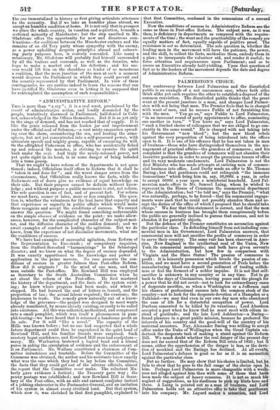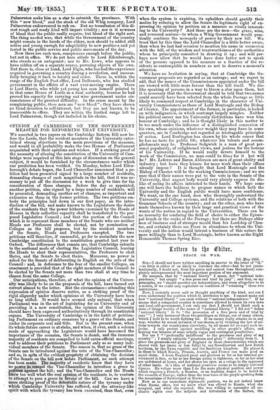PALMERSTON'S CHOICE.
THE controversy between Lord Palmerston and the dissatisfied public is an example of a not uncommon ease, where both sides think alike yet each requires the other to establish a disproof of the common conviction. The dissatisfied public thinks that the great want at the present juncture is a man, and charges Lord Palmer- ston with not being that man. The Premier feels that he is charged with want of men, and he accuses Public of not furnishing him with the men. "You go on," says Public to Lord Palmerston, "in an incessant round of party appointments to office, nominating one another in turn." "You leave us," says Lord ?almerston, "such a limited choice of colleagues that we are obliged to go con- stantly in the same round." He is charged with not taking into his Government "new blood"; but the new blood rebels against the very proposition of being introduced into the offices open to it. It is one of his offences that he has not taken in men of business—those who have distinguished themselves in the ma- nagement of practical affairs—the grandees of commerce ; and his complaint is that the grandees of commerce will not abandon their lucrative positions in order to accept the precarious tenure of office and its very moderate emoluments. Lord Palmerston is not the first Minister who has made attempts at enticing men of commer- cial business into office. Lord Derby made an offer to Mr. Thomas Baring; but that gentleman could not relinquish "the immense transactions" which bring him in, say, 50,0001. a year, in order to accept 5000/. a year upon a ministerial leasehold. Lord Pal- merston made offers to Mr. Samuel Laing, whom be wished to represent in the House of Commons the commercial department of the Administration; but "he told me," says the Premier, "what was naturally, perhaps, to be feared—that his commercial engage- ments were such that he could not possibly abandon them and ac- cept the duties of the office of which I proposed that he should take charge." We fear that this statement is correct, and that the men whose success in business has brought them conspicuously before the public are generally inclined to pursue that success, and not to abandon it for patriotic objects. But the defence of the Premier constitutes an accusation against the particular class. In defending himself from not including com- mercial men in his Government, Lord Palmerston answers, that commercial men will not sacrifice the profits of commerce in order to serve their country. The same rule has been observed in Ame- rica. New England is the intellectual soul of the Union, New York its commercial metropolis; and both have given servants to the Administration, but how few in comparison with 'Virginia and the Slave States ! The passion of commerce is profit : it is leisurely possession which breeds the passion of am- bition, and we must have a second generation of Peels before the manufacturing blood can deposit the sediment of trading selfish- ness or feel the ferment of a nobler impulse. It is not that self- sacrifice is unknown in any country or in any time. Not to go back to the days of Cincinnatus leaving peace and the plough for a power that he did not covet—not to look for extraordinary cases of desperate sacrifice, as when a Washington or a Jefferson cast his chance of professional success into the cominon stook of the country—not to look for the desperate devotion of a Hampden or a Falkland—we may find even in our own day men who abandoned the ease of life for a distasteful occupation of power. Lord Durham consented to be killed by its vexations; Lord Aberdeen accepted a post when he knew that he must meet with odium in- stead of gratitude; and the late Lord Ashburton—a Baring— found pleasure in a great public mission, because he preferred the interests of his country and the good-will of the country of his maternal ancestors. Nay, Alexander Baring was willing to accept office under the Duke of Wellington when the Great Captain un- dertook the desperate task of making a stand against the Reform Bill. We much doubt whether the real danger of the present day does not far exceed that of the Reform Bill crisis of 1832; but it seems, either the apprehension of the danger is less, or the devo- tion of mankind and the Billings has declined. At all events, Lord Palmerston's defence is good so far as it is an accusation against the particular class.
But no further. He may show that his choice is limited, but he fails to show that he goes to the full range of the choice open to him. Perhaps Lord Palmerston is more chargeable with a weak- ness not alleged against him than with some of those that have been made the subject of heavy censures. It is not so much his neglect of suggestions, as his readiness to pick up hints here and there. A Laing is pointed out as a man of business' and Lord Palmerston holds out an attractive offer to take that gentleman into his company. Mr. Layard makes a sensation, and Lord this "new blood," and the stock of the old Whig company., Lord Pahnerston endeavoured to rub on. But no transfusion of this di- rect rough and ready kind will impart vitality ; nor is it newness of blood that the public really require, but blood of the right sort. The thing needed was, that while the Government of the corm might remain in the hands of the elders, men should be added s active and young enough for adaptibility to new positions and yet tested in the public service and public movements of the day. Now there are such men, conspicuous enough before the public, but not in office. We do not here allude to Lord Ellenborough, who stands as an antagonist; nor to Mr. Lowe, who appears to have ridden off on a separate course, pursuing objects of his own. But there is, close at hand, Lord Elgin, who has had the experience acquired in governing a country during a revolution, and success- fully bringing it back to loyalty and order. There is, within the range of the English Post-office, Lord Dalhousie, who has studied government in the affairs of a vast ever-moving empire. There is Lord Harris, who while yet young has seen himself pointed to in that same House of Lords as a final authority, because he had proved his capacity for carrying out wise government under cir- cumstances of the greatest difficulty. In the sense meant by the complaining public, these men are "new blood"; they have shown no blind devotion to self-interest, but they are not known to be inaccessible to offers. They are within the limited range left to Lord Palmerston, though not included in his choice.



























 Previous page
Previous page